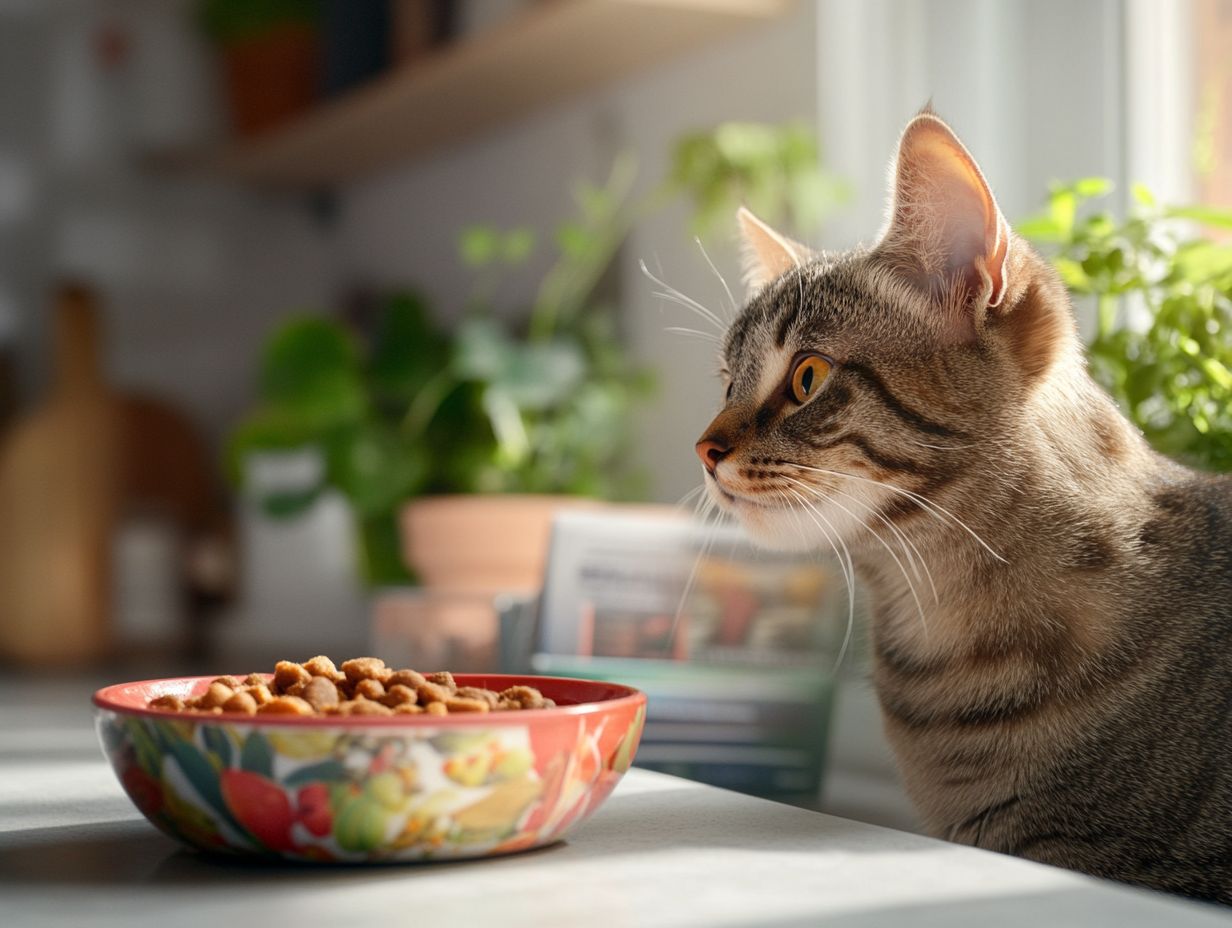As pet owners, we strive to provide our furry friends with the best pet nutrition possible, often leading us to explore the world of natural and organic foods in the context of natural cat food. But what exactly qualifies as “natural” according to AAFCO standards, and is it truly safe?
This article clarifies common misconceptions, highlights the benefits and risks associated with natural cat food, and offers tips on how to select the right option for your pet food. Emphasizing the importance of consulting with veterinary nutritionists and following AAFCO guidelines, we aim to help you make informed choices that can enhance your cat’s health and well-being.
Discover how to navigate the complexities of pet nutrition while addressing special dietary needs, such as those for cats with kidney disease or diabetes.
Key Takeaways:
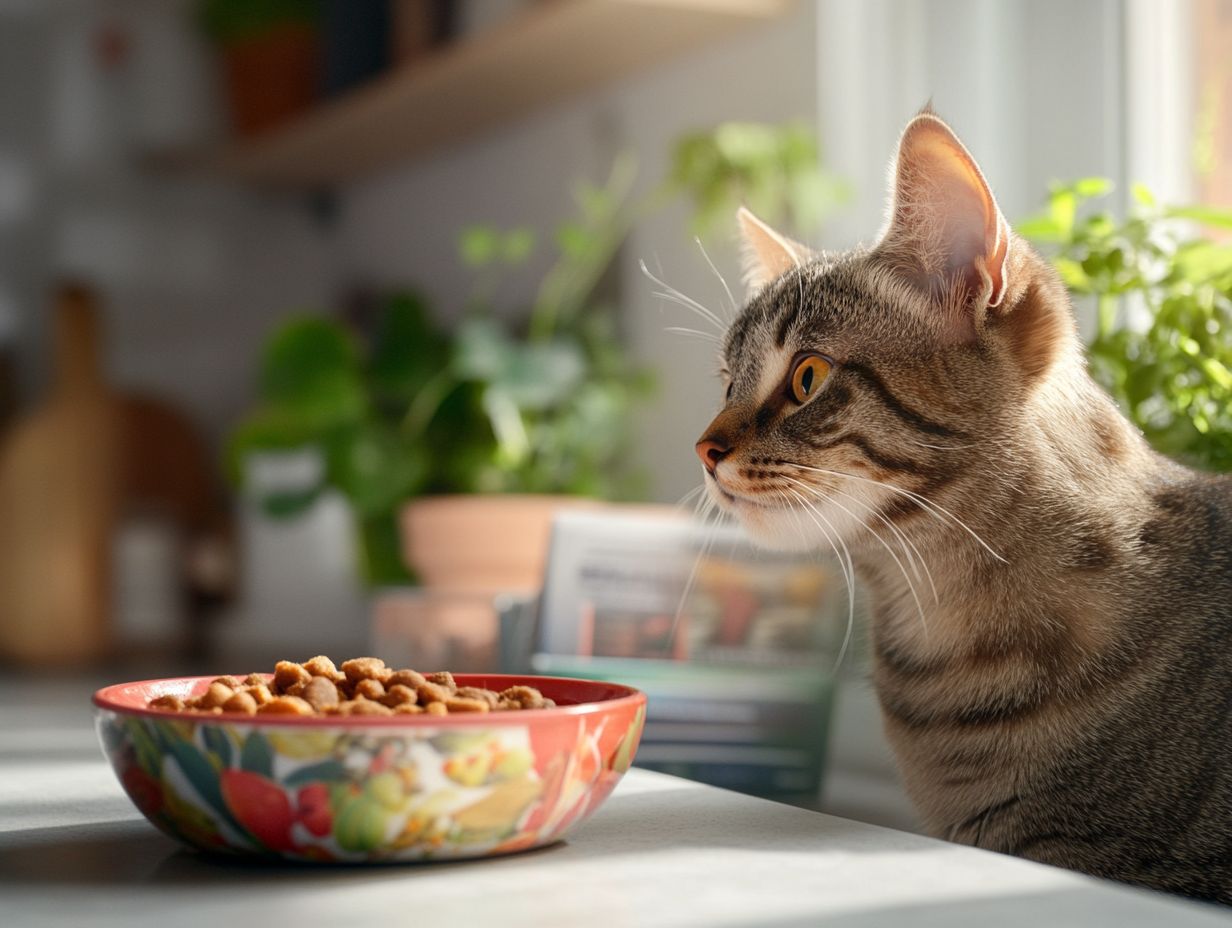
What Is Natural Cat Food?
Natural cat food refers to pet food made from high-quality, wholesome, and minimally processed ingredients that cater to cats’ dietary needs. According to AAFCO, natural cat food must contain ingredients derived from plant or animal sources without artificial colors, flavors, or preservatives. This type of cat food prioritizes human-grade ingredients over animal by-products and often adheres to standards established by veterinary nutritionists and organizations such as the Association of American Feed Control Officials (AAFCO).
The primary goal of natural cat food is to ensure nutritional adequacy, particularly for obligate carnivores like cats who thrive on animal-source proteins. It is essential to consider that vegan diets may lead to deficiencies in crucial nutrients.
Is Natural Cat Food Safe?
The safety of natural cat food is a primary concern for pet owners, as it directly influences the health and well-being of their pets. While natural cat foods are produced under strict safety guidelines, there are still risks associated with the ingredients, including potential contamination from harmful bacteria such as Salmonella, Escherichia coli, and Clostridium. These risks can be mitigated through feeding trials and rigorous nutritional analysis, but it is vital to consult with a veterinarian, especially when considering raw or homemade options.
What Are the Common Myths About Natural Cat Food?
There are several common myths surrounding natural cat food that can lead to consumer misunderstanding, often fueled by misleading marketing. One prevalent myth is that all natural cat foods are inherently better than commercial diets. This is untrue, as the quality and nutritional value of natural cat food can vary significantly.
Another widespread misconception pertains to grain-free diets, which are often marketed as more natural, while gluten grains are depicted as harmful. This creates the false belief that grains and gluten do not belong in a balanced diet for cats, despite their value in providing essential carbohydrates.
Additionally, some brands label their products as “natural” without solid evidence to support these claims, leaving cat owners uncertain about what is truly best for their pets. Such confusion can result in poor food choices.
What Are the Benefits of Natural Cat Food?
Natural cat food offers several benefits, including higher quality ingredients, enhanced nutritional value, and fewer additives and preservatives, all of which contribute to the overall health and dietary needs of cats.
Known for its superior quality ingredients, natural cat food typically provides better protein sources, enhanced protein quality, and a more balanced diet. It also boasts a higher nutritional value, as the absence of synthetic ingredients, preservatives, and additives results in an increased concentration of essential nutrients that support the cat’s digestive, immune, and muscular systems.
Additionally, natural cat food contains fewer additives and preservatives. While commercially preserved food often has a longer shelf life, it may include artificial ingredients and additives that are less beneficial for cats.
1. Better Quality Ingredients
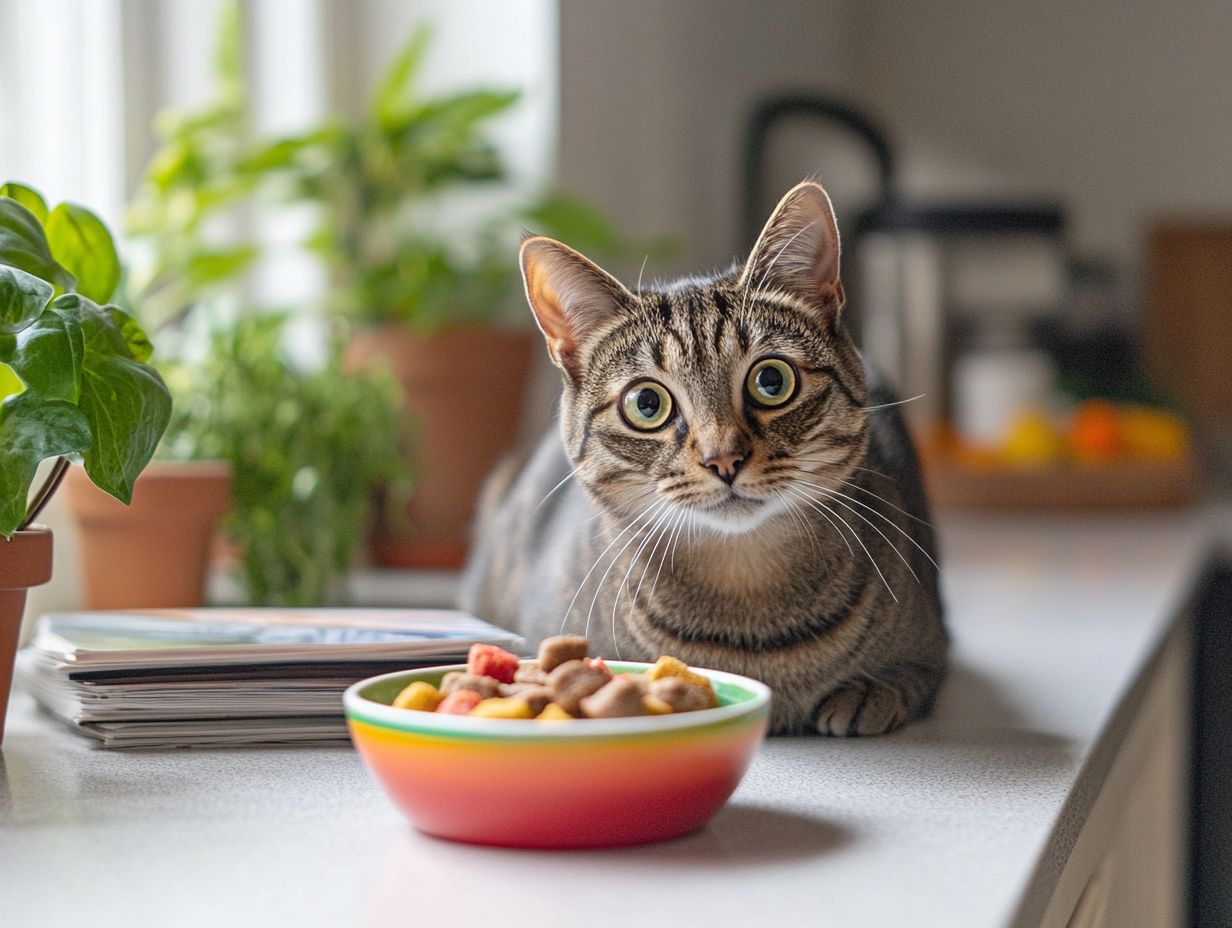
The primary benefits of natural cat food lie in its emphasis on high-quality ingredients sourced from human-grade sources rather than animal by-products. This focus leads to improved nutrition and the absence of harmful additives commonly found in many commercial diets.
It is crucial for pet owners to be aware of allergen safety and to check for common allergens and harmful additives in commercial foods. Furthermore, practical advice on proper food storage and handling practices, including identifying spoilage signs, can help ensure food safety.
For those concerned about weight management, consider guidelines from veterinary organizations that recommend portion control and regular monitoring of your cat’s weight to maintain optimal health.
As a result, cats often experience improved digestion supported by studies indicating that diets rich in fiber enhance gastrointestinal health, increased energy linked to higher protein levels, and shinier coats attributed to essential fatty acids—noticeable enhancements that contribute to an improved quality of life for pet owners dedicated to their cats’ well-being. Natural cat food provides owners with verified health benefits, knowing they are supporting their pets’ health through scientifically backed nutrition.
Additionally, since most natural cat food options contain higher protein and nutrient levels compared to conventional choices, often evaluated against AAFCO or WSAVA guidelines, owners strengthen their bond with their cats as they observe the positive changes in their pets’ health and vitality.
2. More Nutritional Value
Natural cat food typically offers greater nutritional value compared to commercial options, as the best natural cat food brands formulate their products to include all the essential macronutrients (like protein and fats) and micronutrients (such as vitamins and minerals) relevant to a cat’s specific dietary needs, including taurine and arachidonic acid. Natural cat food is nutrient-dense, which contributes to better digestion and vitality, unlike commercial foods that often contain higher calorie content due to fillers.
While commercial diets primarily consist of fillers and artificial ingredients, natural diets are made from whole foods that enhance a cat’s overall wellbeing. High-quality proteins found in natural cat food can significantly improve a cat’s skin and coat health. Omega-3 and Omega-6 fatty acids, derived from sources like fish oil and flaxseed, are crucial in a cat’s diet as they help boost the immune system. Additionally, antioxidants play a key role in maintaining a cat’s eye health, which is vital for their hunting skills.
Vitamins A, D, and E are also essential components of a cat’s diet: Vitamin A supports eye health, Vitamin D is important for bone density, and Vitamin E is necessary for energy metabolism. These vitamins are essential for different life stages of cats (kittens, adults, and seniors) and align with the principles of clinical nutrition. By providing their cats with natural food rich in these nutrients, cat owners can ensure their pets lead longer, healthier lives, laying the foundation for a more active and fulfilling lifestyle.
3. Fewer Additives and Preservatives
Natural cat food contains fewer additives and preservatives, which reduces the likelihood of adverse reactions in pets, particularly for those with food allergies or sensitivities. Studies suggest that minimal processing of natural cat food results in a cleaner final product that is less likely to contain potentially harmful ingredients. Additionally, this type of food aligns more closely with the natural dietary preferences of cats. By choosing natural options, pet owners can help decrease the chances of their cats experiencing gastrointestinal upset or skin irritations linked to artificial ingredients.
A diet rich in whole foods allows cats to better absorb essential nutrients vital for their overall health and vitality. Cleaner formulas can also provide reassurance for those concerned about allergens in their pets’ food, contributing to improved health. It is essential for responsible pet owners to understand that the food they offer their companions today can significantly impact their immediate health as well as their long-term vitality and happiness.
What Are the Risks of Feeding Natural Cat Food?
Natural cat food poses several risks that pet owners should consider before making the switch. The primary concerns include nutritional imbalance if not aligned with AAFCO guidelines, cost, and availability compared to conventional commercial diets. It is crucial to consult with a veterinarian before making dietary changes, especially for cats with specific health conditions or dietary restrictions.
Nutritional imbalance is a significant issue, particularly if the food is not formulated according to AAFCO standards (i.e., it lacks a nutritional adequacy statement). Ensuring that natural cat food contains the appropriate mix and levels of nutrients can be challenging. For instance, the preparation of natural food may result in either excessive or insufficient protein levels, and cats might not receive adequate essential vitamins and minerals from their diet. Some homemade or raw diets may lack critical nutrients commonly found in commercial options that meet AAFCO guidelines.
1. Potential for Nutritional Imbalance
Nutritional imbalance poses a significant risk when feeding cats natural food, particularly if the diet is not formulated by veterinary nutritionists or fails to meet AAFCO guidelines. Without proper nutritional analysis, cats may miss essential nutrients, which can negatively impact their health. This deficiency can lead to a variety of health issues, ranging from poor immune function to growth and developmental problems.
Ethical and Sustainability Concerns
When choosing natural cat foods, it is important to consider the sourcing of ingredients and the environmental impact. Some natural options may offer health benefits, but pet owners should be aware of ethical sourcing practices that may affect the overall quality.
Practical Feeding Advice
To ensure the safety of natural cat food, pet owners should follow safe food storage and handling practices, such as proper refrigeration and recognizing signs of spoilage. This is essential in maintaining the health benefits associated with natural diets.
A healthy diet for cats should typically include a balanced mix of proteins, fats, carbohydrates, vitamins, and minerals to meet their metabolic needs. As obligate carnivores, cats require a diet primarily based on animal proteins. For instance, proteins from sources like chicken or fish are crucial for maintaining muscle tone. A deficiency in taurine—an essential amino acid found in these proteins—can lead to serious health issues including irreversible heart disease. It’s essential to consult a veterinarian or veterinary nutritionist to ensure all nutritional needs are met.
Veterinary nutritionists play a vital role in evaluating ingredient profiles and creating diets that provide complete nutrition. They assist pet owners in identifying signs of nutrient deficiencies, such as weakness or poor coat quality, which may indicate dietary adjustments are needed. Special attention should be paid to diets that may lack essential nutrients, such as those that are raw or vegan.
2. Higher Cost
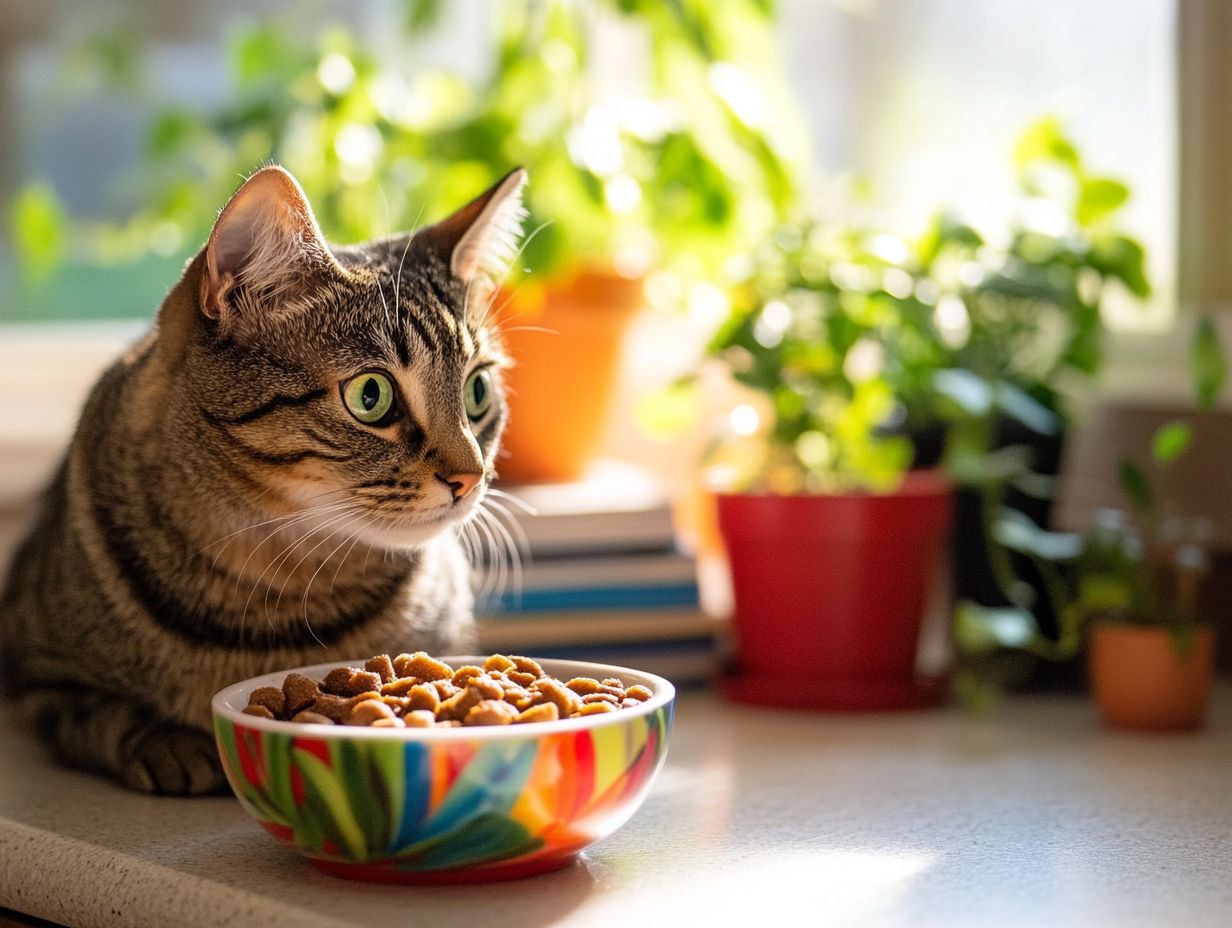
Natural cat food tends to be more expensive than conventional commercial diets, which is a significant consideration for many pet owners. This price difference reflects the higher manufacturing and ingredient costs associated with human-grade and minimally processed products.
Typically, natural cat foods feature high-quality protein sources sourced from ethical farms and fisheries. The absence of fillers, artificial preservatives, and by-products means that the sourcing and processing methods are often more labor- and capital-intensive. This elevated standard of production addresses the growing concerns of health-conscious owners regarding their cats’ long-term well-being.
To alleviate the financial burden, pet owners can consider several solutions:
- Buying in bulk
- Comparing brands to find the best-quality options at lower prices
- Exploring homemade natural cat food alternatives while ensuring proper nutrition
In many cases, the higher costs of natural cat food are offset by the benefits of increased energy levels and improved coat condition.
3. Limited Availability
Another concern for pet owners considering natural cat food is the limited availability of certain brands or formulations, which can complicate maintaining a consistent feeding schedule. While some pet stores may carry a variety of commercial diets, options for natural cat food are often more restricted. This can lead to disappointment for those dedicated to finding the best quality nutrition for their cats.
Depending on their geographic location, pet owners may need to travel to specialty pet stores or even order online, which can result in shipping delays. To mitigate these issues, pet owners should research local suppliers in advance and establish a reliable online ordering system.
Additionally, signing up for delivery services or engaging with local pet-oriented communities can provide alternative channels for accessing a broader range of products. Buying in bulk can also help reduce costs while ensuring that their beloved pets always have access to their favorite meals.
How to Choose the Right Natural Cat Food?
When choosing natural cat food for your feline companion, several important factors should be considered, as they can significantly impact your cat’s health and well-being.
- Ingredients List: Examine the ingredients list closely to ensure it contains high-quality proteins and essential nutrients.
- ‘Complete and Balanced’ Label: Look for this label on the packaging, as it indicates that the food meets the minimum nutritional requirements established by veterinary nutritionists and adheres to the standards set by the Association of American Feed Control Officials (AAFCO).
1. Read the Ingredients List
Reading the ingredients list is one of the most effective ways to choose natural cat food, as it reveals information about the quality and type of ingredients used. Pet owners should prioritize foods that list high-quality protein sources first, ensuring that their cat receives the necessary nutrients for optimal health.
According to the Center for Veterinary Medicine at the United States Food and Drug Administration (FDA), proteins such as chicken, turkey, or fish appearing at the top of the list indicate a higher animal-based content in the food. It is also important to avoid products that contain fillers like corn or soy, as these ingredients typically offer little nutritional value and can contribute to obesity over time.
Consider that dietary needs vary for cats with conditions like kidney disease or diabetes. Consulting with a veterinarian will help identify nutrient profiles that are beneficial for these specific health issues. Supplements may also be necessary; it’s crucial to determine which ones are safe and appropriate under veterinary guidance.
Also, take into account that kittens, senior cats, and pregnant or nursing cats have unique nutritional requirements that should be addressed. Lastly, store and handle food carefully, checking for signs of spoilage to ensure your cat’s safety.
Understanding the significance of essential nutrients, such as omega fatty acids and vitamins, can further assist in selecting a well-rounded diet. For instance, cat food containing fish oil or appropriate fruits and vegetables is a good choice for overall health, while options with unnecessary artificial preservatives should be avoided to promote your cat’s long-term well-being. It’s always advisable to consult with a veterinarian before making dietary changes, especially for cats with specific health concerns.
2. Look for a ‘Complete and Balanced’ Label
When selecting natural cat food, it is essential to look for a “complete and balanced” label. This label indicates that the product meets the nutritional standards set by the Association of American Feed Control Officials (AAFCO) or similar organizations in other countries. Such a designation assures pet owners that the food contains all the macronutrients and micronutrients necessary for their cat’s good health. Nutritional profiles differ for various life stages; for example, kitten food requires higher protein and fat levels for growth, while adult cat food needs controlled protein and fat content to maintain weight.
Specifically, it means that the product provides required proteins, fats, carbohydrates, vitamins, and minerals, and these claims have been substantiated through testing. Therefore, cat owners can feel confident that their pets are receiving all essential nutrients.
To determine if a natural cat food has achieved “complete and balanced” status, pet owners should look for an AAFCO statement on the packaging. This statement clarifies whether the food meets the nutrient profiles established for different life stages, including growth and development, reproduction, or adult maintenance.
Additionally, pet owners should research the brand’s history and reputation, considering ingredient sourcing and customer reviews to ensure that the food is appropriate for their pet’s dietary needs.
3. Consider Your Cat’s Individual Needs
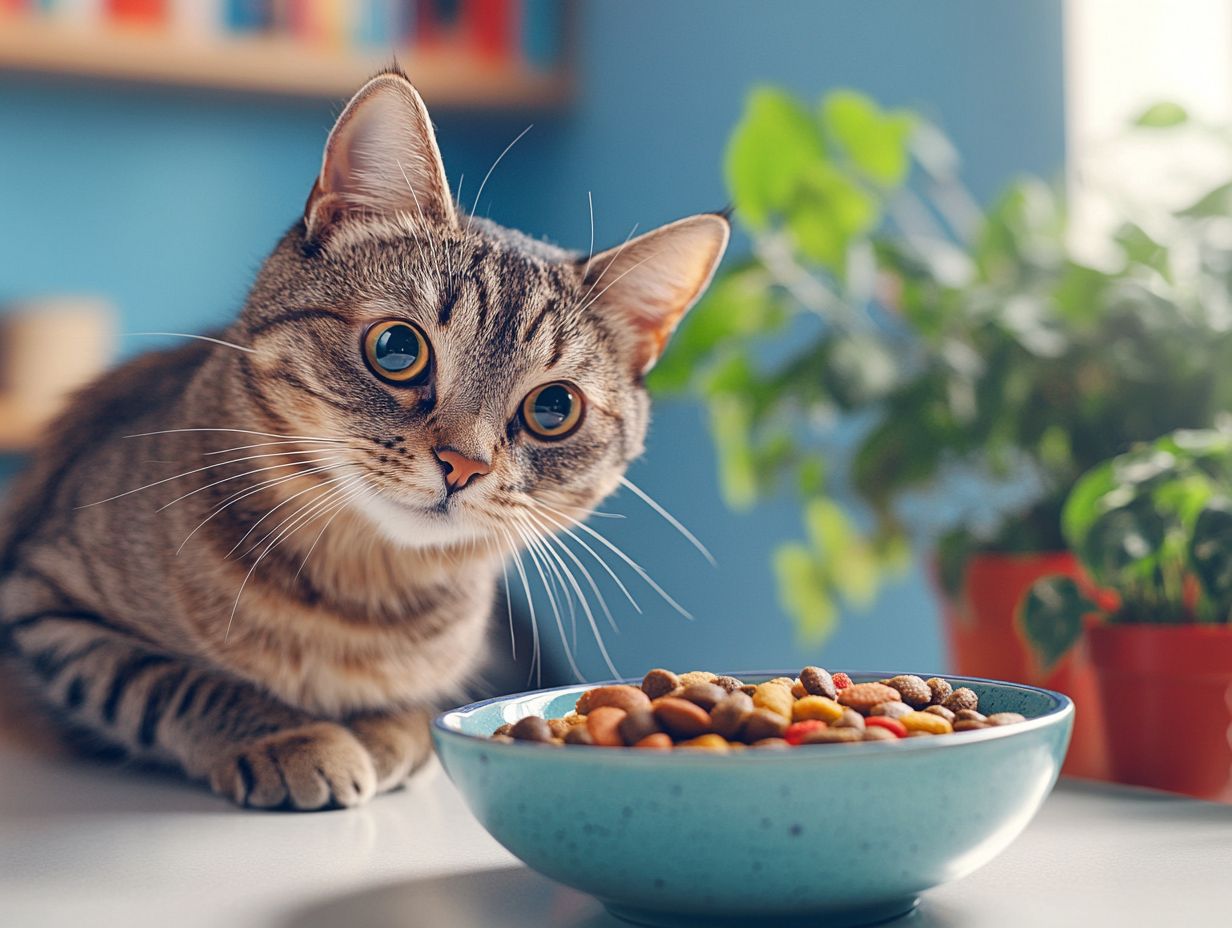
When determining the right natural cat food, it is essential to consider factors such as your cat’s age, weight, and any specific dietary needs, as each cat is unique and requires tailored nutritional considerations. This is especially crucial for cats with certain medical conditions or allergies, and veterinary nutritionists can provide valuable assistance in making these choices. For example, cats with diabetes may require lower carbohydrate content, while those with kidney problems may benefit from controlled protein levels.
Additionally, food preferences can significantly influence the decisions owners make. If a particular brand of natural food does not meet the unique requirements of your cat, they may refuse to eat it or even become ill from it. It’s important to remember that cats have unique preferences that may not align with human expectations, and influences from human food can lead to inappropriate choices.
Therefore, it is helpful to understand your cat’s likes and dislikes when searching for a suitable natural food brand. For example, if your cat has a sensitive stomach and prefers softer foods, it is important to look for brands that offer this option. A professional veterinarian or nutritionist can assist you in identifying the types of ingredients that will be beneficial in these situations.
Frequently Asked Questions
Is natural cat food safe?
Yes, natural cat food is safe for your feline friends. In fact, it is often considered a healthier and safer option compared to commercial cat food, which may contain artificial ingredients and fillers. Veterinary professionals often support this view, citing studies that show natural diets can positively impact feline health.
Are all natural cat foods the same?
No, not all natural cat foods are the same. While they may all claim to be made with natural ingredients, it is important to carefully read the label and check for any added preservatives or fillers that may not be beneficial for your cat’s health.
Is natural cat food more expensive than commercial cat food?
Not necessarily. While some natural cat food brands may be more expensive, there are also affordable options available. In the long run, feeding your cat a natural diet may also help prevent health issues and ultimately save you money on vet bills.
Can natural cat food provide all the necessary nutrients for my cat?
Yes, natural cat food can provide all the necessary nutrients for your cat as long as it is properly formulated for cats. Many natural cat food brands are formulated to meet the nutritional needs of cats, and some may even contain additional nutrients and supplements for optimal health. However, careful selection of these additional nutrients is essential to ensure safety and avoid overdosing, particularly with fat-soluble vitamins and minerals.
Is it true that natural cat food is only for cats with allergies or sensitivities?
No, while natural cat food can be beneficial for cats with specific health issues, it is not exclusively for those with allergies or sensitivities. Cats of all health backgrounds can benefit from a well-formulated natural diet that meets their unique nutritional needs.
No, natural cat food is not just for cats with allergies or sensitivities. Natural cat food is defined as food that contains no artificial preservatives, colors, or flavors and is aligned with AAFCO standards. While it can benefit many cats, it should be nutritionally complete and cater to their obligate carnivore nature, with an emphasis on animal-source proteins that are essential for their health. A natural diet can improve their overall well-being and help prevent potential health issues in the future. However, improperly balanced diets can lead to nutritional deficiencies, so it’s crucial to consider these factors.
Can I make my own natural cat food at home?
Yes, you can make your own natural cat food at home. However, it is essential to consult with a veterinarian or a veterinary nutritionist to ensure that your homemade diet meets AAFCO and WSAVA guidelines for a balanced diet. Special dietary considerations must be taken into account for cats with specific health conditions, such as kidney disease or diabetes. Additionally, a disclaimer about the potential risks of feeding improperly balanced homemade diets, including nutritional deficiencies, should always be considered. Proper food storage and handling practices are vital to prevent spoilage and ensure safety. It’s also important to note the risks associated with feeding cats a raw diet, including pathogen exposure, highlighting the necessity of veterinary consultation before making any significant diet changes, particularly when considering raw or homemade options.
